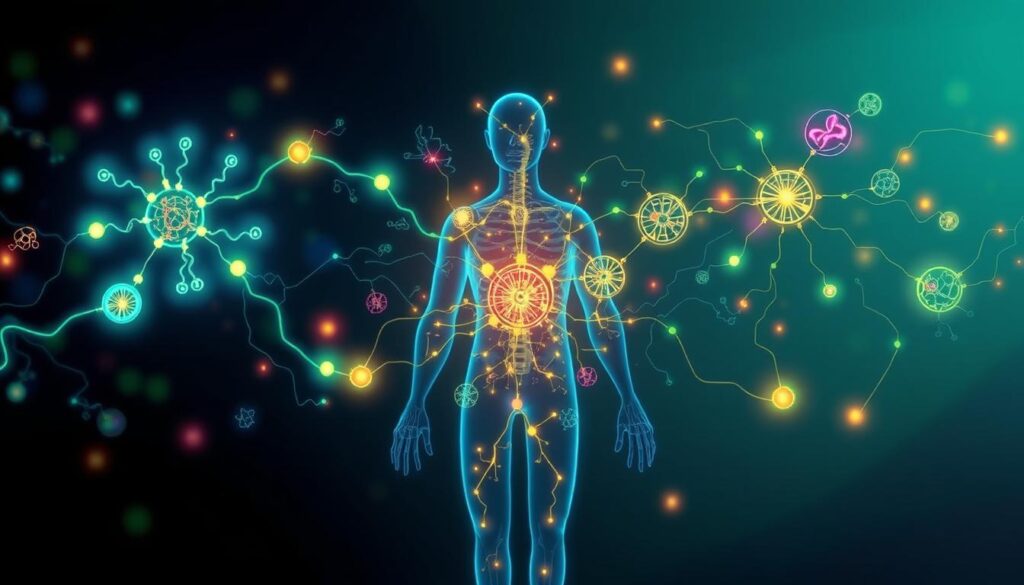Aging is something we all face, but can we slow it down? New studies show our diet might affect how fast we age. They look at calorie restriction, intermittent fasting, and nutrient-dense diets. These diets could greatly impact our longevity and health.
In this article, we’ll dive into the science behind these anti-aging diets. We’ll find out if they really can fight off aging.
Key Takeaways
- Calorie restriction has been shown to extend lifespan in various animal models by up to 300%.
- Intermittent fasting and related dietary interventions can lead to a 20-40% reduction in caloric intake and significant increases in lifespan in rodents.
- Nutrient-dense diets, such as those rich in antioxidants and anti-inflammatory compounds, may help support cellular health and delay the onset of age-related diseases.
- Understanding the underlying mechanisms of anti-aging diets, such as their impact on metabolism, inflammation, and cellular processes, is key to unlocking their full potential.
- Lessons from the “Blue Zones,” regions with high concentrations of centenarians, suggest that traditional dietary patterns and lifestyle factors play a crucial role in promoting longevity.
The Calorie Restriction Paradigm
For decades, calorie restriction (CR) has been a key strategy for fighting aging. Studies in rodents and other animals have shown that eating less can make them live longer. This means the less they eat, the longer they live.
CR’s benefits aren’t just for animals. It has also been tested in non-human primates like rhesus and squirrel monkeys. These studies have made the case for CR’s role in human aging and longevity even stronger.
Mechanisms of Calorie Restriction and Dietary Restriction
Scientists have dug deep into how CR and dietary restriction (DR) work. They’ve found that CR changes how genes work in different parts of the body. It also affects genes related to energy and inflammation in fat tissue, which helps explain its benefits.
| Key Mechanisms of Calorie Restriction | Impact |
|---|---|
| Modulation of nutrient-sensing pathways (mTOR, AMPK, insulin/IGF-1, FOXO, sirtuins) | Improved cellular energy homeostasis and stress response |
| Reduction in oxidative stress and inflammation | Decreased cellular damage and improved cellular function |
| Optimization of mitochondrial function and biogenesis | Enhanced energy production and reduced oxidative damage |
| Upregulation of autophagy and DNA repair mechanisms | Improved cellular quality control and genomic stability |
These findings have helped us understand how CR and DR can help us live longer and healthier lives. They show that these strategies can work across many species, from yeast to mammals.

Anti-Aging Diets: The Rise of Alternatives
Classic calorie restriction (CR) is well-known for helping animals live longer. But, new diets like intermittent fasting (IF), fasting-mimicking diets (FMD), and ketogenic diets (KD) are gaining attention. These diets also include protein restriction and diets low in certain amino acids.
In a study with 22 pairs of twins, half ate vegan and the other half ate omnivorous. The vegan group lost more weight and had better cholesterol and insulin levels. They also showed younger biological ages through epigenetic markers.
This study was short-term and doesn’t show long-term effects. But, it hints that vegan diets might slow aging. More research is needed to confirm this.
For decades, scientists have looked into how food affects aging. They suggest eating foods rich in antioxidants and isoflavones to slow aging. Nutraceuticals, like supplements and herbal extracts, are also seen as beneficial.
As research continues, new diets like IF and FMD are being studied. They might help people live healthier and younger.

Can Diet Slow Down Aging?
The link between diet and aging is complex and fascinating. Research on animals shows that eating less can make them live longer and stay healthier as they age. But, the proof for this in humans is not as clear-cut.
Recent studies hint that eating a bit less can slow down aging in people. For instance, eating 12% fewer calories for two years can make you age 2-3% slower. This could also lower your risk of dying by 10-15% in the next 10 to 15 years.
The CALERIE trial was a big study on eating less. It found that cutting calories can slow aging by 2-3% in two years. Most people in the study ate 20% fewer calories, and those who did saw even bigger benefits.
A 2023 study showed that eating 25% fewer calories can slow aging by 2% to 3%. This is important because the U.S. recommends adults eat between 1,600 and 3,000 calories a day. In this study, people cut their calories by 12% on average after two years.
How eating less slows aging is still a mystery. But it seems to involve reducing inflammation and keeping metabolism high. It also helps keep muscle strength up, even when you lose weight.
More research is needed to understand calorie restriction’s effects on heart health and bones. But, the current evidence shows that eating a bit less can slow aging. Cutting calories by 10% can be hard, though, as it might make you hungry and lead to nutrient deficiencies. Eating healthier foods instead of high-calorie ones can help meet calorie goals without losing nutrients.
In summary, diet can help slow aging, with eating less and healthier foods being key. Changing your diet is a big step, so it’s crucial to work with doctors to make a plan that’s right for you.
Anti-Aging Diets and Human Health
Dietary interventions may do more than just extend our lives. Research shows that anti-aging diets can greatly improve our health and wellbeing.
Potential Benefits Beyond Longevity
Diets like intermittent fasting, fasting-mimicking diets, and ketogenic diets have shown promise. They can improve metabolic health by reducing insulin resistance and improving glucose control. They also help decrease liver fat.
A study on a fast-mimicking diet involved 100 participants. It found that those who started with a regular diet then switched showed better health. They had a lower risk of diabetes and less fat in the liver. Their immune system also improved.
Interestingly, these individuals looked biologically younger than they did at the start of the study.
Another study with 1,644 participants showed that following the MIND diet slowed aging. It found that slower aging was linked to a lower risk of heart disease, cancer, and diabetes.

“The improvements in health markers and biological age persisted even after accounting for weight loss caused by the diet.”
These studies suggest that anti-aging diets can improve both lifespan and healthspan. They can enhance metabolic health, immune function, and reduce inflammation. This could have a big impact on our overall health and longevity.
Mechanisms of Anti-Aging Diets
Dietary interventions like calorie restriction and intermittent fasting may slow aging. They work by changing how cells grow and respond to stress. This is through pathways like mTOR, AMPK, and insulin/IGF-1 signaling.
Studies in the 1990s showed that rats lived longer when they ate less. This led to the idea of calorie restriction. It’s believed that proteins like AMPK and mTOR help make these diets work.
Now, diets like fasting-mimicking and ketogenic diets are getting attention. They can make mice healthier and live longer. Protein restriction and time-restricted feeding also show promise in slowing aging.
While these diets are popular, their long-term effects on humans are still unknown. But, research suggests that mTOR inhibition is key. Scientists are working to understand how these diets can help us live longer.
| Dietary Intervention | Key Findings |
|---|---|
| Calorie Restriction (CR) | Consuming 35% fewer calories led to an almost linear increase in lifespan in mice. Ribosomes use 10-20% of the cell’s total energy to build proteins for cell operation. Calorie-restricted mice had higher energy levels and suffered from fewer diseases. |
| Fasting-Mimicking Diets (FMDs) and Intermittent Fasting (IF) | FMDs and IF induced ketogenesis and improved age-related parameters in rodents. |
| Protein Restriction (PR) | PR has shown to delay signs of aging and increase lifespan in rodents. |
| Amino Acid Restriction | Restriction of certain essential amino acids can extend life span through mTOR signaling inhibition. |

Anti-aging diets show promise, but more research is needed. We must understand their long-term effects on humans. The role of mTOR inhibition is crucial in these diets’ potential benefits.
Challenges and Considerations
Exploring anti-aging diets is fascinating, but there are big hurdles to overcome. One major challenge of anti-aging diets is sticking to them long-term. Diets like calorie restriction or intermittent fasting are hard to follow for many people. It’s tough both mentally and physically, and many give up.
Another big issue is how different people react to these diets. Not everyone will see the same benefits. The results can vary a lot based on genetics, age, and health. It’s also tricky to apply findings from animal studies to humans because our bodies and environments are different.
There’s also concern about the long-term effects and safety of these diets. Eating fewer calories or making big changes to your diet can lead to health problems if not done right. It’s important to have a healthcare professional’s help to make sure these diets are safe and work for you.
| Challenge | Description |
|---|---|
| Adherence | Maintaining strict dietary protocols, such as calorie restriction or intermittent fasting, can be mentally and physically demanding, leading to a high risk of dropout or non-compliance. |
| Individual Variability | The response to anti-aging diets can vary significantly based on factors like genetics, age, and overall health status, making it challenging to generalize the benefits. |
| Translating Animal Studies | The promising results observed in animal studies may not directly translate to human populations due to differences in physiology and environmental factors. |
| Long-term Effects and Safety | The long-term effects and safety of anti-aging diets are not yet fully understood, and they may potentially lead to nutritional deficiencies or other health complications if not properly managed. |
To tackle these challenges, we need a comprehensive approach. This includes ongoing research, tailored dietary advice, and teamwork between individuals, healthcare providers, and experts. By focusing on these areas, we can create lasting and effective ways to support healthy aging and longevity.

Blue Zones and Dietary Habits
Researchers are studying “Blue Zones” to find out how people live long lives. These areas, like Okinawa, Japan, and the Nicoya Peninsula in Costa Rica, show us how to live longer and healthier. They have special diets and lifestyles that help them live past 100.
Lessons from Longevity Hotspots
Dan Buettner’s Blue Zones idea found common habits among centenarians. They eat mostly whole foods and drink alcohol in moderation. They also have strong social ties.
People in these areas focus on lifestyle factors too. They stay active with gardening and walking. They also manage stress well. Dr. Valter Longo’s diet is another example, focusing on pescatarian and intermittent fasting.
Learning from Blue Zones shows us that health is about more than just food. It’s about how we live our lives. This approach can help us live longer and healthier.
Putting It All Together
Research on anti-aging diets and Blue Zones shows we need a detailed plan for healthy aging. Diets like calorie restriction and intermittent fasting might slow aging. But, what works for one person might not work for another.
To get the most from anti-aging diets, we must tailor them to each person. We should look at lifestyle, health, and how long we can keep up with the diet. This way, we focus on both living longer and staying healthy.
Here are some key points for a personalized plan:
- Eat a diet full of fruits, veggies, whole grains, lean proteins, and healthy fats. This supports health and prevents disease.
- Try intermittent fasting or time-restricted eating. It can help with calorie control and cell renewal.
- Adjust your diet to fit your needs, like more fiber, protein, and vitamin D as you get older.
- Make sure to stay active, manage stress, and get enough sleep. These habits help your diet work better.
- Keep an eye on health markers and adjust your diet as needed.
By taking a holistic and tailored approach, we can make anti-aging diets a lasting part of our lives. This strategy supports both longevity and quality of life, keeping us healthy as we age.
| Nutrient | Potential Benefits | Food Sources |
|---|---|---|
| Fiber | Supports gut health, reduces disease risk, and helps maintain a healthy weight. | Fruits, vegetables, whole grains, legumes, nuts, and seeds. |
| Protein | Preserves muscle mass, supports immune function, and aids in tissue repair. | Lean meats, poultry, fish, eggs, dairy, legumes, and soy-based products. |
| Vitamin D | Promotes bone health, immune function, and cognitive function. | Fatty fish, fortified dairy products, and sunlight exposure. |
“Adopting a healthy, balanced diet and lifestyle is not just about living longer, but about living better and maintaining our physical and mental well-being as we age.”
Conclusion
Dietary interventions are getting more attention for slowing aging and increasing longevity. Animal studies have shown calorie restriction’s anti-aging effects. Now, we also look at intermittent fasting, ketogenic diets, and nutrient restriction as potential strategies.
Understanding how diet affects aging is complex. It seems a personalized nutrition plan might be the best way to improve healthspan and longevity. Genetic makeup, gut health, and lifestyle play big roles in how well these diets work.
Looking ahead, we need to learn more about diet, metabolism, and aging. We should also work on making dietary advice more tailored to each person. This way, we can aim for a future where aging healthily is common, not rare.





